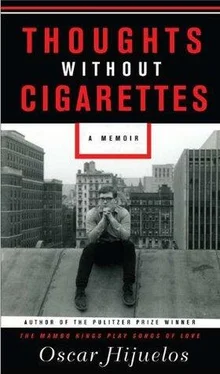It’s likely that my father carried me there himself, my mother in a frantic state following by his side, or perhaps they had sprung for the luxury of a taxi ride, with Altchek, no doubt, accompanying us. It’s possible that I was so listless as to approach unconsciousness, gone under like my uncle in Cuba after his fall; the truth is I don’t remember much about that evening — I probably don’t want to, or, as is likely, I had lapsed into a coma. I haven’t the slightest idea of the treatments they administered in the emergency room, nor the day of the week, nor at just what hour I had been given a little wristband, admitted officially as a patient, then transferred to an intensive care ward, but that night, as my mother later put it, that carajo —the burden — my illness brought my family began.

No doubt she spent the passing hours nervously, and if my father remained true to form, having already become one of those conscientious fellows— un trabajador through and through — who perpetually worries about his image as a worker, he would have stayed in the hospital until it was time for him to begin his daily morning trek to the 116th Street subway on Broadway in silence, likely consumed with anxiety and bewildered. He probably spent that night smoking one cigarette after the other in the waiting room, all the while perhaps thinking about his older brother, the first Oscar Hijuelos, the parallels between us disturbing him. Later at the hotel, on the same morning after I had entered the hospital, while ensconced in the kitchen of the Biltmore Men’s Bar with his chums, he probably had his first drink earlier in the day than usual — compliments of the bartender, a cubano , who took care of him. At least he must have felt blameless about me, but my mother? Told that I was suffering from a severe infection of the kidneys, she must have despaired at my misfortune and felt mystified by her plain bad luck. Perplexed as she waited in the hospital, her own uncertainties heightened, she must have certainly felt her own twinges of guilt. After all, I had gotten sick in her care and nearly died that very night, and for months afterward, my condition remained, to quote my brother, “touch and go.”
Years later, when I’d ask her just what had happened, she’d always look down into her hands, as if just mentioning it left her feeling ashamed. She would always have the expression of a woman who, having tried hard to protect me, believed that she had failed. Sitting with her in the kitchen, I’d get the impression that my mother, unapproachable in so many ways, almost felt that she had no right to me as a son, and that deep down, she wanted to wrap her arms around me but couldn’t: It was on such an occasion that she once declared, “But, oh, hijo , it wasn’t anything we wanted for you.”
For the longest time, all I would know was that I had gotten sick in Cuba, from Cuban microbios , that the illness had blossomed in the land of my forebears, the country where I had once been loved and whose language fell as music on my ears. Of course, diseases happen anywhere, and children get sick under any circumstances, but what I would hear for years afterward from my mother was that something Cuban had nearly killed me and, in the process of my healing, would turn my own “Cubanness” into air.
The few things I do remember about my initial hospitalization — tubes shoved up me and medicinal smells, and dreary wards, and a terrible loneliness, blood being constantly taken and bitter-tasting pills — seem to have unfolded in the kind of darkness that children experience in bad dreams. Bloated and seeping blood, I must have felt that something had gone wrong, but did I even know? Was I even awake at first? After all, it was common for nephritis to put children under for two and three weeks at a time, sometimes longer, if they awakened at all, and even if I had been aware of it, what on earth could I have been feeling?
They moved me to the St. Luke’s Convalescent Hospital in Greenwich after a month or so, and from what I can recall, I was constantly given pills. Nurses pushed along carts on which sat quivering little white paper cups of diuretics and antibiotic tablets, though some of the kids, off in the deeper end, would have been treated for a week or so at a time intravenously; bedpans were the rule, and a mixture of food and children’s toilet smells filled the air. Sweets were unknown to us, and what I mainly remember of the food amounted to the blandest of things — like boiled potatoes and carrots, cream of wheat, and possibly skim milk, along with some form of protein, like broiled chicken, but never served with salt, and skinless, a far cry from the euphoria of fat-laced, crispy lechón —ah, Cuba, Cuba. What birds we saw went flying through pictures on the walls, and while I have a vague recollection of playing with a set of Tinkertoys and of seeing a few brightly colored toy trucks rolling across a floor, the wonderful nature of daily childhood discovery seems not to have been a part of my stay. I doubt that we did much of anything at all except submit to our treatments and sleep and sleep and sleep. I’d sometimes hear the other children crying, and moaning in pain — from what, I don’t know, perhaps from loneliness — but though it’s hard to see their faces now, I would pop up in the middle of the night, feeling overwhelmed by the notion that these kids were only fleeting shadows, slipping away and just out of reach from me, on the other side of the room.
Though I spent a year in that place, I haven’t a single name of any of the home’s doctors or nurses in my head or, for that matter, any sense of what the hospital’s staff members looked like, though my guess is that in the Connecticut of 1955–56, they were most likely decent, locally recruited New England folks, and since it seems to have had a somewhat religious atmosphere — here and there crucifixes hung on the walls — I would imagine that a chapel could be found somewhere inside and a chaplain, perhaps an Episcopalian priest, who would officiate over the services, say prayers over the young patients’ beds, and console parents when things did not quite work out.
You see, there were others in my ward, some whose renal functions worsened and never quite recovered. It’s a fact that not all the kids who were sent there to convalesce got better, some beds emptying mysteriously overnight. Those who were healthy enough were allowed into a playroom. That’s where I got to know Theresa, a pigtailed, sweet-natured girl who, also suffering from nephritis, exhibited the same listlessness and bloated limbs as I: We were cooped up in the same rooms; our arms ached in the same way from where blood had been taken; our urine swished, pinkish, in vials; and, in that isolation, there was always someone around to examine for blood what we’d left in the bedpan or potty. Breathing haltingly, we shared the same shocked expression and, like all the kids in that place, went for months without seeing the light of day, for we were never allowed outside to romp in the surrounding greens, whose sunny glare we spied flowing through the windows far above us. If I have mentioned her, it’s because Theresa is the only name I came away with from that hospital and because, as it would happen, aside from recalling that we were always playing with alphabet blocks on the floor and that I’d sometimes see her curled up in a corner, drowsily trying to stay awake — whatever medicines they gave us knocked us out — she would be the only fellow patient I’d run into years later, during my feeble-brained and quite timid adolescence.
Ah, but the anxieties we shared, the treatments I received, and the isolation I felt during that period would later come back to me in recurring dreams, the chronic nightmares I’d suffer from well into my thirties. In one of them I’d feel a rod — possibly a catheter — being inserted into my urethra, and a flinching over that pain, some nasty burning in my center; the sensation, as well, of choking on the dryness of pills, of swallowing metallic powders, would come to me, along with this odd fearful logic that accompanied those rituals: If I swallowed one of those pills, I’d die, while on the other hand, if I didn’t, I’d still die. Razors with pinheads pricked at my fingertips, drawing blood, and with so many things entering me, up my rectum sometimes, injections in the hard tissues of the buttocks, no wonder so many of my dreams turned into nightmares. In the silence of that ward at night, with only the humming of machines softly breathing like the children themselves, down the halls, a haunting darkness with almost a smothering human nature, like floating shrouds or shadows, which made one cry out, and some other lingering sensations that involved electricity, which would rise as a great shock from inside the body, that plump swollen bag filled with microbios , with sludge and Cuban shit, and probably with sins — why else would you be there in the first place? And while all that was going on, I’d begun to forget myself.
Читать дальше













